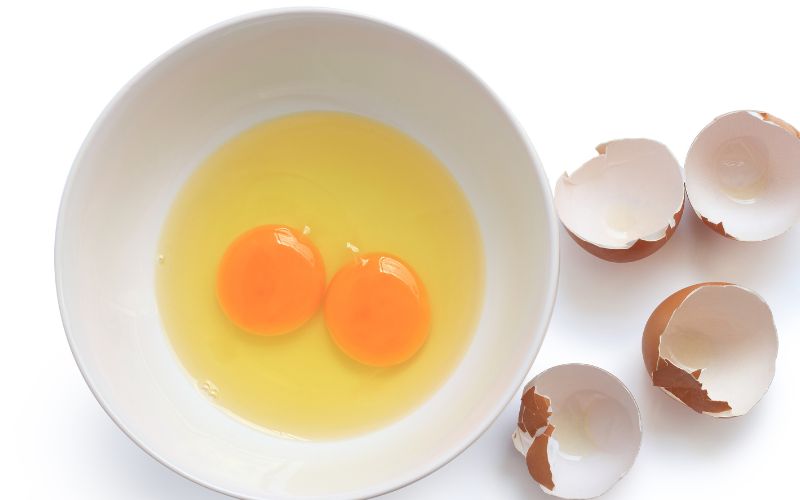How Long Are Liquid Eggs Good After Expiration Date?
Last updated on October 26th, 2022 at 05:20 pm
Before now, if you want to eat eggs, you must crack the shells before releasing the contents.
But, liquid eggs save you from the stress of cracking. Liquid eggs are without shells and come readily available for use in a container.
However, liquid egg products undergo pasteurization to prevent microbes from acting on them, thereby increasing their lifespan.
So, how long can Liquid eggs still be effective after the expiration date, and is it safe to eat the expired eggs?
Liquid eggs can still be good after seven days of their expiration dates on the container. For liquid eggs without an expiration date, use them within seven days after purchase. During this period, ensure the eggs are at room temperature and free from bacteria and other contaminants.
How Long Can You Use Eggs After the Expiry Date?

The United States Department of Agriculture (USDA) states, “You can store liquid egg products that lack an expiration date for seven days.
It must be at a temperature of 40°F or less if it’s yet to be open.”
But what if you’ve opened it and it’s past the expiration date, and you need to store the rest? In that case, it wouldn’t last more than three days after opening.
Also, it’s advisable to consume it entirely since there’s a tendency that it might contain some germs after that.
What Happens If You Eat Expired Liquid Eggs?
Eating expired liquid eggs could damage your health if you don’t store them properly before ingesting them.
And, when these eggs expire and eventually spoil, they have little or no nutrients to offer to the body.
But, the good news is that; some people resist the side effects of eating spoiled and expired liquid eggs.
In detail, you’ll find below some side effects you could experience if you eat expired liquid egg products.
#1. Bacterial Infection
Salmonella, a bacteria that destroys the alimentary canal of animals, can successfully live in eggs.
And that’s the main reason we pasteurize; to destroy the bacteria. But the longer the eggs stay, the bacteria finds its way to the eggs and starts breeding.
When this disease-causing microbe comes in contact with the liquid eggs, the quality of the egg declines.
Another bacteria, E. Coli, breeds on eggs too. All these are microbial actions you might overlook early until the microbes densely infest the liquid egg white.
As the population of the bacteria rises, the liquid egg white deteriorates. Therefore, consuming such liquid will cause diseases in which symptoms come first.
They include;
- Vomiting
- Diarrhea (Frequent stooling)
- Abdominal cramps and Stomach aches
- Fever
#2. Allergic Responses
Some people are allergic to egg whites, and consuming them irritates their body system.
So, when they eat expired liquid egg whites, it tends to trigger some allergic responses such as vomiting, coughing, sneezing, rashes, and nausea.
In some cases, this consumption could result in difficulty breathing, a decrease in blood pressure, and oral irritation.
These symptoms emerge within 6-36 hours after consumption and sometimes might persist to 4-7 days and eventually disappear on their own.
How Long Are Unopened Liquid Eggs Good After Expiration Date?
Unopened liquid eggs should last for a few days after the expiration date.
The reason is that when they’re not open, they give micro-organisms and contaminants no access to them.
To keep your liquid eggs from going bad quickly after expiration, you need to employ an excellent technique to keep the eggs.
So, I advise you always to store them in a refrigerator. While storing, ensure you keep the unopened liquid eggs at a temperature of less than 70°F.
However, refrigerating may not retain some qualities of the liquid egg but would help preserve it.
However, you should look at the label for the expiration date. This information comes in handy when determining how long it would last in the refrigerator after expiration.
#1. Expiration Date
Assuming an egg Manufacturer wants to put information on the expiration on the egg’s carton, it could come in month/day format.
It would follow “Exp,” “Sell by,” and “Not to be sold.”
A pack date is usually a three-digit number stating the day of the year they packaged the eggs.
It is in the form “000“. For instance, “003” represents January 3, and “360” means December 26. And it can assume the format “YYMMDD” or “MMDDYY.”
However, the sell-by date tells the date the liquid eggs must be off the counter, although it isn’t accurate.
Consuming the eggs after their sell-by date isn’t harmful, but they might begin to lose their good features after that date.
Conclusively, not all liquid eggs have expiration dates on their containers, while some do.
The reason is that the US federal government does not always demand Manufacturers to inscribe the expiration date.
Meanwhile, some states in the USA permit Producers to print this information on the label.
How Can You Tell if Liquid Eggs Are Bad?
Before buying any liquid egg product, check the label for the Best before date.
But most times, you might have bought the egg white and kept it in the house for too long while the Liquid Egg white ages.
To know if it’s still safe for use, look out for these noticeable changes in the appearance of the liquid egg whites.
#1. Changes in Texture
Pasteurization helps sterilize the liquid eggs and lengthen their shelf lives. It doesn’t alter their texture. The thicker the eggs, the fresher it is.
So, if you notice that the liquid eggs are thin and less dense, don’t blame it on pasteurization.
The thinness signifies that the eggs have gone bad because eggs are supposed to be thick.
#2. Changes in Taste
Liquid eggs have no flavoring, so they taste like every other egg. But, when you perceive a rotten egg taste after tasting the eggs, the eggs are rotten.
To be on the safer side, taste your liquid egg first. Then, if it still has that fresh taste, you’re good to go.
But if otherwise, spit it out to prevent food poisoning, and send the eggs to the trash can immediately.
#3. Presence of Mold
Molds appearing on your liquid egg white is a red flag. It shows that bacteria such as Salmonella have started breeding on it.
And consuming it will harm your health. Hence, discard the eggs. There’s a likelihood for molds to form on the eggs before the release of the offensive odor.
#4. Change in Color
Egg whites could be yellow, white, or off-white. If yours is any of these colors and you notice a change in the color, it’s a sign that they aren’t good.
Meanwhile, you might see a thread-like substance in the liquid; it is the chalazae and causes no harm. It’s a normal part of an egg.
Final Thoughts
Liquid eggs are highly proteinous and could remain intact even after expiration.
But, only proper refrigeration can make them safe after their expiry date. Before the eggs spoil, you’ll notice changes in the eggs’ physical features.






